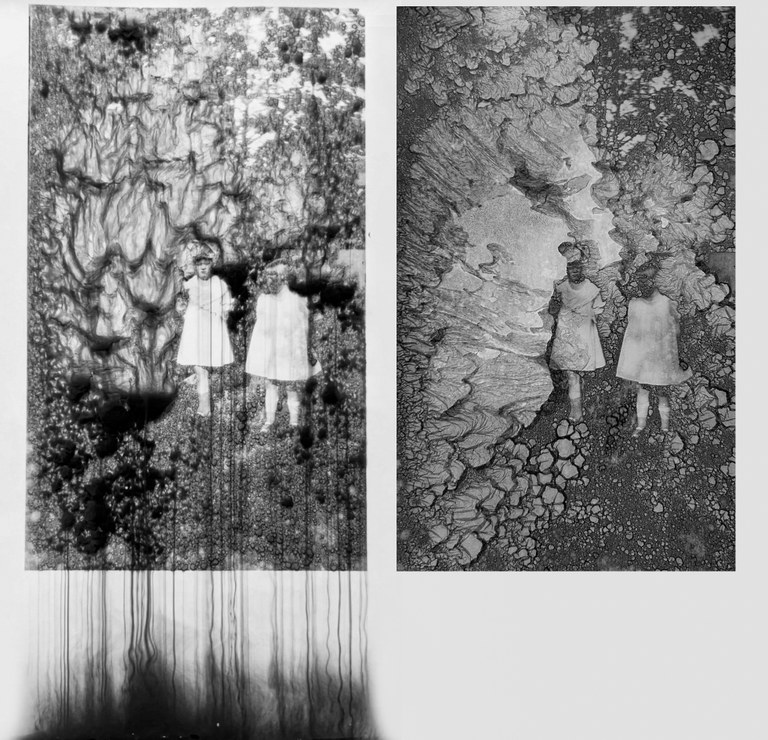2025-26: CFP: Being Human in the AI Era
Commonwealth Center for the Humanities and Society (CCHS)
Image Credit: Stills from "Mordançage Timelapse" (process video) 2024 by John Day, MFA candidate at the Hite Institute of Art + Design, UofL The Commonwealth Center for Humanities and Society develops an annual theme that provides the foundation for the academic year's scheduled events, including the Bingham Faculty Fellows program. The theme for the 2025-2026 academic year will be Being Human in the AI Era. Fellows applying may specialize in areas that can inform a range of adjacent conversations regarding the role of AI today. The rhetoric around generative AI can be hyperbolic. Whether euphoric or dystopic, this rhetoric depicts a future of technological, political, social, linguistic, medical, ethical, material, and economic disruption that seems largely out of our control. And yet, this is not a given. In fact, humanists can challenge totalizing narratives through their contextualizing, analytic, creative, and ethical expertise. This expertise can shift conversations from what is possible to, What is advisable? What can history teach us? What unexamined assumptions need to be addressed? Who or what is absent from the dominant stories? Such questions can enrich our understanding of the emergent and entangled forces assembling around generative AI which, in turn, can guide how we choose to act when engaging with AI's promise and pitfalls. We imagine the 2025-26 Fellows may explore this theme in a variety of ways, including but not limited to the following questions: ABOUT THE BINGHAM FACULTY FELLOWSHIP For 2025-2026, the Commonwealth Center for Humanities and Society seeks to create an intellectually diverse group of up to six fellows who will benefit from conducting their research in a multidisciplinary setting. We are seeking a mix of tenured and tenure-track A&S faculty engaged in humanistic scholarship. People who have received a CCHS fellowship in the past are eligible to apply, though CCHS Advisory Board members are not eligible to apply. Fellows are required to be in residence during the academic year, to present one lecture or one workshop on their research, and to participate in all the bi-monthly activities while completing their own research projects. We support amazing opportunities available to you, but if you cannot make these meetings, you should apply in a future year. Fellows actively shape CCHS programming for the academic year, from inviting distinguished guest speakers to finding innovative ways to share scholarship with our arts and culture partners in the community; CCHS can help engaged scholars connect to these cultural partners. Fellows receive one course release. Fellows receive a supplemental research/travel stipend from CCHS estimated at $1,500 (pre-tax). YOUR APPLICATION Applications are due Sunday, January 12th, 2025, and require: Current CV Proposal of up to 1,000 words. Primarily, your proposal should describe a project you will pursue as a Fellow, what outcomes you anticipate, and how that project connects to this year's theme. While theoretical, empirical, historical, sociocultural, and creative approaches in the humanities and social science are all welcome, your proposal should indicate how your project connects to humanities questions, projects and/or methodologies. Secondarily, your application should describe how your project would benefit from collaboration with scholars in other humanities-related fields. If you have received a fellowship in the past, briefly (1-2 sentences) note the outcomes of your previous fellowship. Brief letter of support from applicant's department chairperson. This letter guarantees one course release and assures a teaching schedule that will not conflict with Fellow's bi-monthly Friday meetings (12:00-1:00). This letter also comments on the substance of the application as well as the applicant's ability both to work in a collaborative setting and to make all BFF meetings. Please email all materials to the CCHS Project Coordinator, Emily Ravenscraft, emily.ravenscraft@louisville.edu. Fellows will be appointed by the Dean, as recommended by the CCHS Advisory Board, and will be named at the end of January 2025.CCHS Bingham Faculty Fellowships

Being Human in the AI Era
